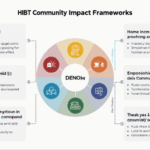Cryptocurrency CSR Reporting: A New Wave for Blockchain Transparency
With the rapid evolution of cryptocurrency, industry players are increasingly looking for ways to demonstrate their commitment to transparency and social responsibility. In 2024 alone, it was reported that $4.1 billion was lost to DeFi hacks, which raised crucial questions about security and ethical practices in the digital asset landscape. As the demand for accountability grows, so does the importance of Cryptocurrency CSR Reporting.
What is Cryptocurrency CSR Reporting?
Corporate Social Responsibility (CSR) has become a significant aspect of business in the modern world. For cryptocurrency platforms, CSR reporting refers to the practice of disclosing the social, economic, and environmental impacts of their operations. Like traditional industries, the cryptocurrency sector now faces increasing scrutiny regarding its ethical footprint.
Why Is CSR Reporting Essential for Cryptocurrencies?
- Builds Trust: Transparency in operations can help build trust with users and investors.
- Regulatory Compliance: Enhanced CSR practices could lead to better compliance with evolving regulations.
- Attracting Investors: A commitment to ethical practices makes cryptocurrency platforms more appealing to socially conscious investors.
In Vietnam, the cryptocurrency market has seen remarkable growth, with the number of active users increasing by 110% in the past year alone. This data emphasizes the need for local platforms to adopt rigorous CSR practices to cater to a booming user base.

The Components of Effective CSR Reporting
Implementing a robust CSR reporting framework involves various components. Let’s break it down:
- Environmental Impact: Assessing the ecological footprint of blockchain operations, such as energy consumption and carbon emissions.
- Social Equity: Addressing how the platform contributes to social equity, particularly in underbanked communities.
- Governance: Ensuring that operations adhere to ethical governance standards.
For example, platforms that utilize energy-efficient consensus mechanisms may report their reductions in energy use, thereby enhancing their CSR image. This category includes protocols like Proof of Stake or newer mechanisms such as Proof of History, which promise energy efficiency compared to traditional Proof of Work models.
Case Studies of Cryptocurrency Platforms Practicing CSR
As CSR reporting becomes more prevalent in the crypto space, several platforms stand out for their innovative practices:
- Ethereum: Initiatives to move towards a Proof of Stake model, significantly reducing its energy footprint.
- Ripple: Its commitment to social equity through projects aimed at providing financial access to underserved populations.
- Cardano: Actively participating in education and community development in countries like Ethiopia.
The Role of Auditing and Transparency in CSR Reporting
While CSR reporting is essential, it must also be backed by auditing to ensure credibility. Third-party audits can help verify the claims made by cryptocurrency platforms in their CSR reports. This practice builds trust among users and helps to avoid accusations of ‘greenwashing.’
For instance, conducting regular audits of smart contracts is fundamental to protecting against vulnerabilities that could compromise user funds. Learning how to audit smart contracts can foster better security and transparency.
Challenges in Cryptocurrency CSR Reporting
Despite its importance, several challenges exist in the realm of CSR reporting for cryptocurrencies:
- Standardization: The lack of standardized frameworks for cryptocurrency CSR reporting can lead to inconsistencies.
- Complex Regulations: Navigating the myriad of international regulations can be daunting for many platforms.
- Technological Limitations: Many platforms struggle with the technological infrastructure required for rigorous reporting.
To address these challenges, cryptocurrency platforms may need to collaborate with regulatory bodies and standard-setting organizations to develop a consensus on CSR metrics that are applicable to the cryptocurrency sector.
Future Trends in Cryptocurrency CSR Reporting
Looking ahead, several trends are poised to shape the future of CSR reporting in the cryptocurrency world:
- Integration of Blockchain: Utilizing blockchain itself to provide transparent and immutable CSR reporting.
- Enhanced Regulatory Guidelines: As governments introduce tighter regulations, more robust CSR frameworks will emerge.
- Increased Stakeholder Demands: Growing consumer awareness will push platforms to adopt more transparent and accountable practices.
Incorporating Vietnamese perspectives is critical; as the Southeast Asian blockchain industry burgeons, adopting CSR can improve relationships with local communities and regulators.
The Importance of Localizing CSR Reports
When developing CSR reports, localization is essential. Adapting communications to reflect local cultures and needs can enhance the effectiveness of CSR initiatives. For instance, addressing local economic issues can resonate more deeply with Vietnamese users, showcasing a platform’s genuine commitment to social responsibility.
Platforms like Binance and Coinbase have made strides in localizing their services for different markets, which can boost user engagement and loyalty.
Conclusion: Building a Responsible Future
As the cryptocurrency landscape continues to evolve, Cryptocurrency CSR reporting will take center stage in promoting transparency and accountability. For platforms, the move towards responsible practices not only aligns with user expectations but also ensures long-term viability in a rapidly changing marketplace.
In conclusion, the integration of effective CSR reporting can bolster credibility and trust for cryptocurrency platforms, specifically in regions like Vietnam where user growth is surging. Reliable and transparent CSR practices will not only enhance a platform’s reputation but also contribute positively to community development.
With the right strategies and commitment, cryptocurrency platforms can lead by example in the fight for a more socially responsible digital future.
References:
– According to Chainalysis reports, significant crypto transactions are now monitored.
– Statistics acquired from local Vietnamese blockchain research studies.
!function(t,e){"object"==typeof exports&&"undefined"!=typeof module?module.exports=e():"function"==typeof define&&define.amd?define(e):(t="undefined"!=typeof globalThis?globalThis:t||self).LazyLoad=e()}(this,function(){"use strict";function e(){return(e=Object.assign||function(t){for(var e=1;e




